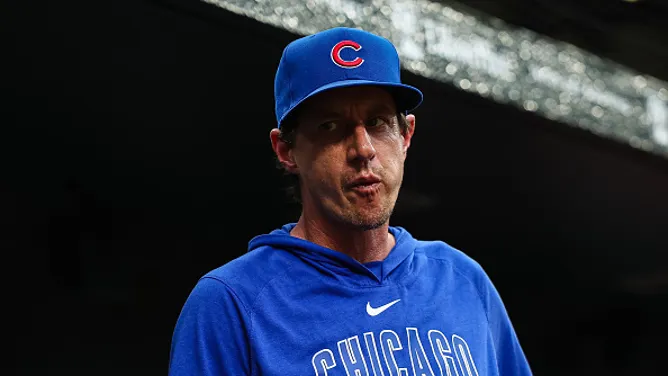

Just when the Cubs thought they were scripting a long-term success story, the pen ran dry—and not in the bullpen. Front offices love playing financial chess with rising stars, but sometimes, the rook forgets to follow the script. In a league where teams toss millions at potential faster than a 100-mph heater, Chicago’s latest move—or lack thereof—feels more like a swing and a miss than a savvy sacrifice bunt.
Watch What’s Trending Now!
The Chicago Cubs aren’t making many headlines with their on-field performance. And off the field, things aren’t looking much better, either! Talks around a contract extension with Pete Crow-Armstrong have reportedly hit a wall. And from the outside, it doesn’t reflect well on the Cubs’ front office strategy.
Mark Feinsand reported on his X handle that the Cubs had approached Crow-Armstrong for an extension, but they could not come to a conclusion. He also clarified a few things: “Per sources, the deal the Cubs offered Crow-Armstrong could have maxed out ~$75 million if all option years had been exercised, but was not a guaranteed contract in that range.”
What were the Cubs thinking going to Armstrong with this deal? When you consider a player an essential part of the team, you give him a contract that he WILL accept. If you enter the room with ten conditions, the player will surely tune out. No one listens when earning their money feels like passing a test with fine print.
Clarification: Per sources, the deal the Cubs offered Crow-Armstrong could have maxed out ~$75 million if all option years had been exercised, but was not a guaranteed contract in that range. https://t.co/60ccATSAeG
— Mark Feinsand (@Feinsand) April 12, 2025
There is a reason why he is considered an essential part of the team. In 2024, Pete Crow-Armstrong had a solid batting average of .237 with 10 HRs and 47 RBIs. He also showed his elite speed through the 27 steals he had in the season. But this season has not been kind to him. In the 16 games played, he has an average of just .211 with no home runs and just 5 RBIs. However, this is just the start, and with another 146 games to go, he might easily turn things around.
So yes, the numbers this season aren’t sparkling—but who’s writing off a 23-year-old after 16 games? Hopefully not the same front office that thought a “maybe-$75-million-if-the-stars-align” deal would do the trick. The Cubs wanted a discount on a future franchise piece, and Crow-Armstrong politely declined the coupon. If Chicago truly believes he’s essential, they better start acting like it—before someone else does.
The Cubs’ potential post-Pete dilemma: Who steps up after 2030?
The Cubs’ front office is playing a dangerous game with the future of their young star—one misstep, and they could be left scrambling. In a league where promising players are locked down like precious commodities, Chicago seems to be betting that a future without one of its brightest young talents won’t be as bleak as it appears.
But if they fail, who’s going to step into the spotlight after 2030?
If the Cubs can’t convince Pete Crow-Armstrong to stay, they do have some good options lurking. With a fair enough farm system, players like Brennen Davis and Alexander Canario might be suitable for the team. But there are problems, too. Davis has suffered from some injuries and can’t stay fit for long. One scout said, “Davis has the tools to be a starter. It’s about staying healthy and putting it together at the big-league level.”
They could also look into players like Cedric Mullins or Trent Grisham in the free agency market. Both of them offer great speed and defense for the team, making them a potential target. If the Cubs decide to spend, Brendan Rodgers could be a strong trade option. Luis Robert is another possibility, though it would depend on market value and roster needs.
In the end, the Cubs’ options aren’t as grim as they may seem, but the front office still has to play its cards right. Sure, Davis and Canario could be the future, but relying on unproven talent or free-agent signings might be a risky bet. The Cubs can fill the gap—but if they don’t make the right moves, they’ll be left wondering what could’ve been, all while other teams snatch up the stars they let slip away.

